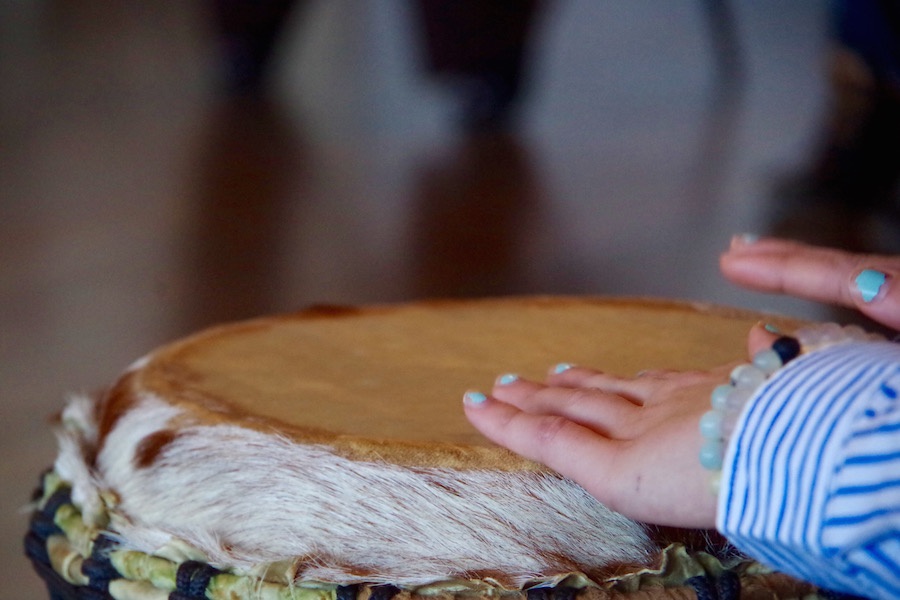
Ed Lab | Long Wharf Theatre | Arts & Culture | New Haven | New Haven Public Schools | Theater
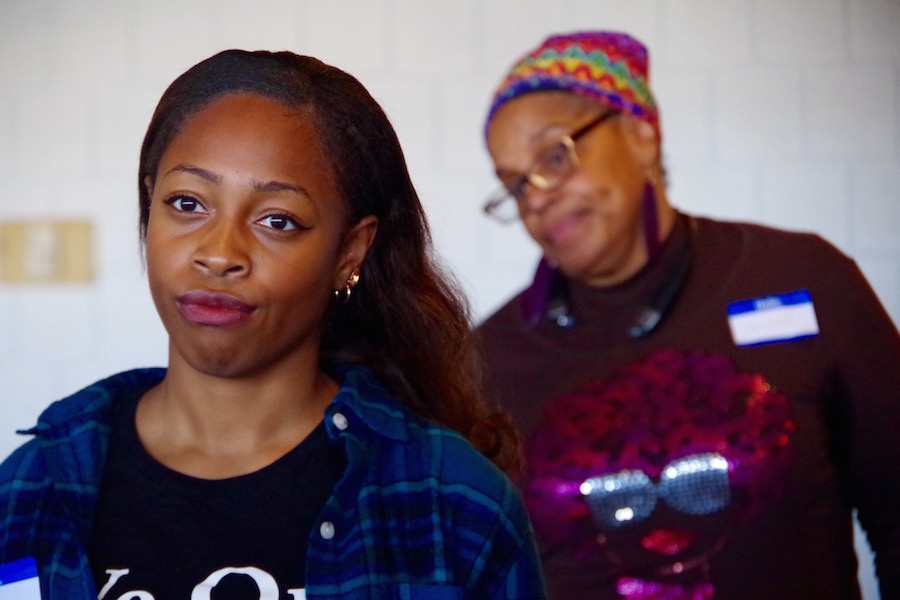 Briana Bellinger-Dawson and Denise Cox role play a customer being followed by a security guard. Lucy Gellman Photos.
Briana Bellinger-Dawson and Denise Cox role play a customer being followed by a security guard. Lucy Gellman Photos.
Briana Bellinger-Dawson was being followed by store security again. Behind her, security guard Dense Cox held her body just slightly to the left, arms out at her sides. Bellinger-Dawson’s black t-shirt undulated with the quick rise and fall of her chest. Neither looked particularly happy to be there.
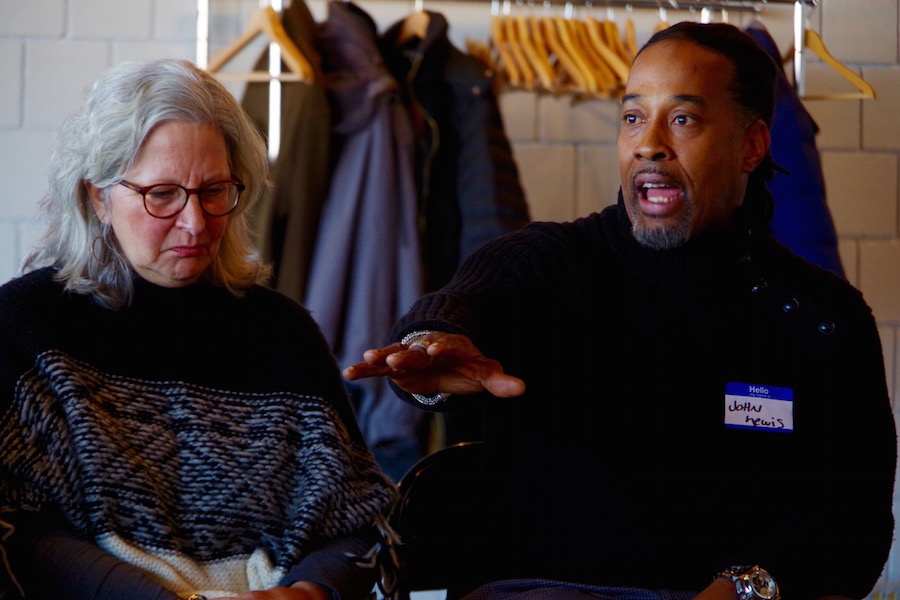 Christgau and Lewis kick off the training.
Christgau and Lewis kick off the training.
But Bellinger-Dawson, a teacher at Nathan Hale, wasn’t really in a store. Cox isn’t really a security guard, but an educator at New Horizons. They were both role playing, frozen in someone else’s shoes before a voice announced “very good, unfreeze.”
Saturday, a small group of New Haven and New Haven area teachers gathered at Long Wharf Theatre for the latest version of Educators’ Laboratory (Ed Lab), a semiannual program that puts educators in conversation with each other, and with plays in Long Wharf’s season. Geared toward the arrival of Office Hour at Long Wharf later this month, Ed Lab brought in partners from the CT Center for Nonviolence (CTCN), Melting Pot Rhythms, and Sandy Hook Promise. Long Wharf has partnered with the last organization for the entirety of the show, with the mission of reducing gun violence in and around schools.
Office Hour tells the story of Dennis, a college student who strikes all of his teachers as a walking concern. He wears all black, writes revenge fantasies that make Tarantino look small and innocuous, and doesn’t seem to click with classmates or faculty. They’re not wrong to think his fixation with the macabre may escalate— it does, leaving both student deaths and immeasurable trauma in its wake. But then time resets, and replays another version of the situation, and another, and another. It’s a sort of groundhog day, that leaves the audience with more questions than answers.
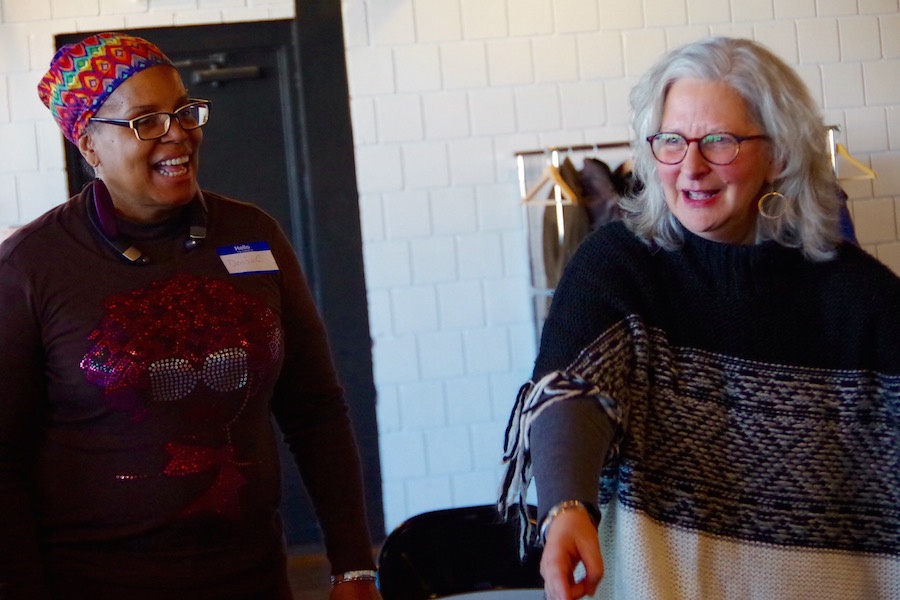 Christgau, with Cox.
Christgau, with Cox.
“It’s really about what happens when we stop seeing each other and stop listening to each other,” said Long Wharf Director of Education Madelyn Ardito Newman, pulling teachers into a wide circle at Long Wharf’s large rehearsal hall. “It’s applicable to all of our lives and all of our classrooms.”
It’s also applicable to stopping a violent situation in its tracks, Newman added—which is why the theater paired with CTCN facilitators Victoria Christgau and Pastor John Lewis, as well as Melting Pot Rythms’ Gamaliel “Gammy” Moses. Focused on building Martin Luther King, Jr.’s “beloved community” in Connecticut classrooms, facilitators honed in on the six principles of Kingian Nonviolence.
The six principles are: Nonviolence is a way for courageous people; The Beloved Community is the framework for the future; Attack the forces of evil, not the people doing evil; Accept suffering without retaliation for the sake of the cause; Avoid internal violence of the spirit, as well as external physical violence; The universe is on the side of justice.
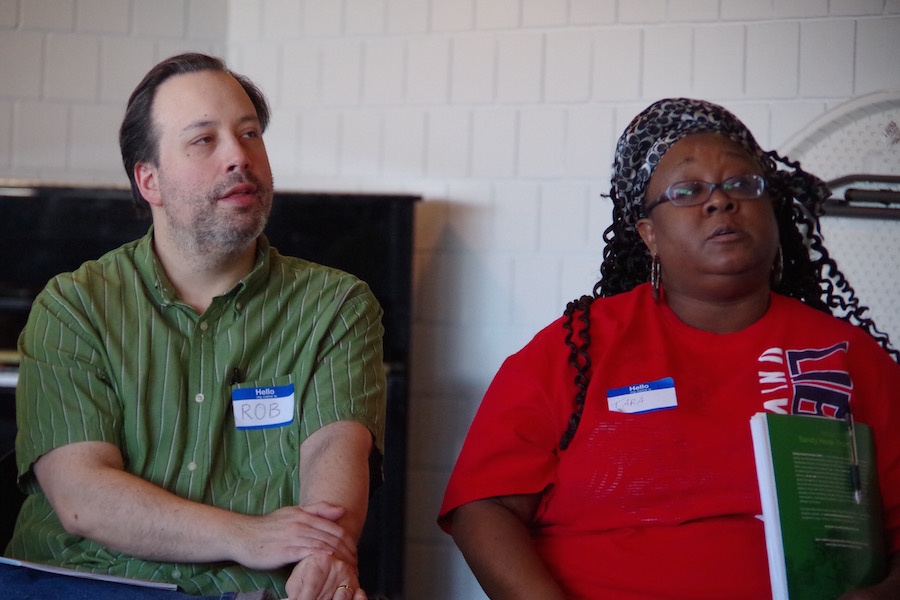 Teachers Rob Esposito and Tara Chapman.
Teachers Rob Esposito and Tara Chapman.
While the CTCN’s full nonviolence training is 80 hours, Christgau, Lewis and Moses had just a little over three. They jumped right in.
“If we don’t start teaching peace and nonviolence from the minute that the child goes to school, we run the risk of continuing the cycle of violence that is ever-present in society,” Christgau said. “There is a framework. There is a landscape. There is a place to go. There is material to draw on. We just have to be more creative and seek it. Starting to teach peace from the moment a child goes to school is necessary for our future to exist.”
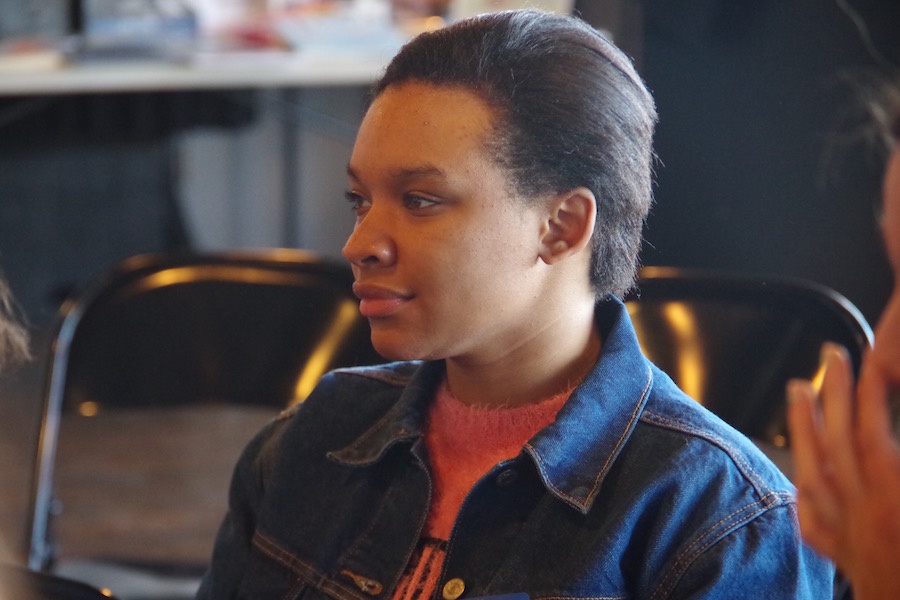 Treneé McGee: I value family.
Treneé McGee: I value family.
“This is going to work where the teacher becomes the practitioner,” Lewis said. “If we can institutionalize Kingian Nonviolence, then everyone will be speaking the same language.”
Speaking, and moving through it. After meeting over a breakfast of banana bread, coffee, and clementines, teachers embarked on a musical-chairs-meets-personal-values exercise that many of them have done with their students. Forming a circle that had one less chair than number of participants, teachers named one thing they valued, and members of the group would stand, and race for another chair if they agreed, leaving one member standing at all times.
Kicking the group off with the statement “I value interracial communication,” Christgau transformed the room into a capsule of shuffling, fast feet and values that whizzed through the air at increased speed. From Co-Op teacher Rob Esposito’s suggestion that “I value appreciation of each other,” members found themselves standing every few moments, trying to get to another chair in time.
From Elizabeth Nearing, Long Wharf’ community relations manager, listening came first. Fair Haven teacher David Weinreb offered “waking up in the morning.”
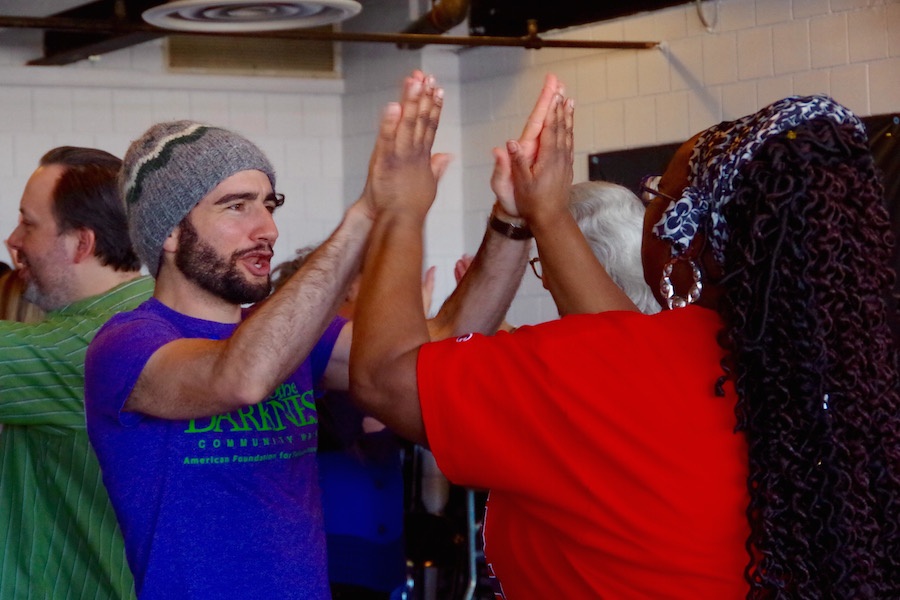 Teachers David Weinreb and Tara Chapman. Later in the session, Gammy Moses led the group in a series of paired clapping, call and response, and African drumming.
Teachers David Weinreb and Tara Chapman. Later in the session, Gammy Moses led the group in a series of paired clapping, call and response, and African drumming.
For Co-Op grad and Resident Teaching Artist Treneé McGee, it was family. Only when Metropolitan Business Academy teacher Matthew Monahan suggested that he valued “being outside” did a few bodies stay in their seats, a wave of giggles and quips about the 10-degree weather floating through the group.
“The objective is to know our values and be courageous enough to stand up for them,” Christgau said at the end. That isn’t always easy to do, Cox suggested in return.
“Sometimes it is really hard to be that one person in a sea of disbelievers,” she said. She described the difficulties that she faced in trying to bring multiculturalism into the curriculum at New Horizons, where she has been a teacher for several years.
Christgau nodded. “In nonviolence, a community has to listen to each other,” she said. “If we do not listen, we cannot communicate. And if we do not communicate, we cannot move forward.”
Take A Walk
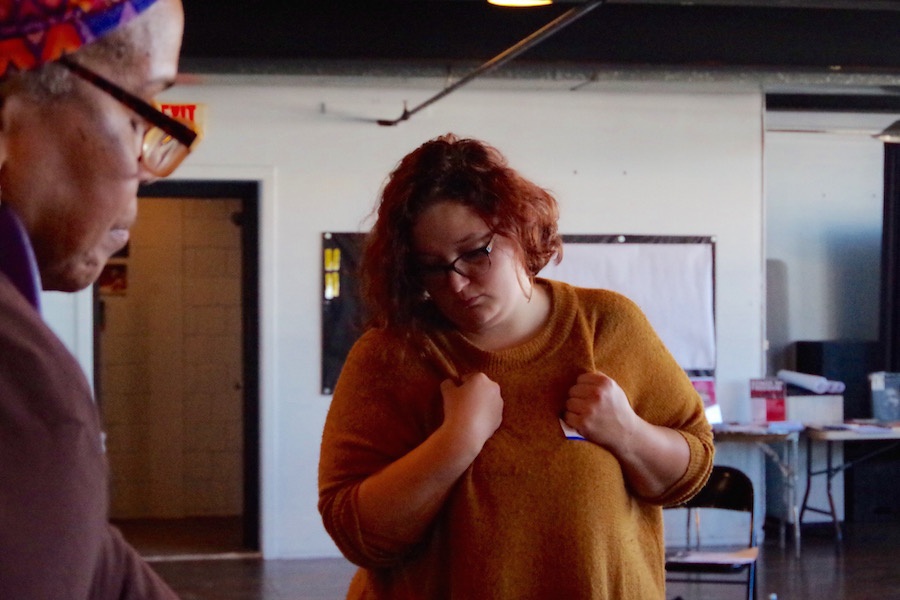 Christgau: "To walk in someone’s shoes, you have to try them on.” Here, Elizabeth Nearing remains frozen as a kid walking home from school as they are trailed by a cop car. Participants spoke about seeing fear in her face.
Christgau: "To walk in someone’s shoes, you have to try them on.” Here, Elizabeth Nearing remains frozen as a kid walking home from school as they are trailed by a cop car. Participants spoke about seeing fear in her face.
Once they began moving through the principals, setting them into motion, participants rarely stopped. On the third—attack the forces of evil, not the people doing evil—Christgau urged participants to “win your opponent over” by understanding where they are coming from. “To walk in someone’s shoes, you have to try them on,” she told the group.
She raised her hands and set the scene, ushering in the first movements of a strange, shape-shifting ballet from the sidelines. In one moment, teachers were businessmen and women on a crowded city sidewalk, already late for work and fighting through a sea of bodies on their route. “You’re late, you’re late, are you going to get there?” bellowed Christgau, her voice coasting over the room.
In another, members aged rapidly, morphing into 90-year-olds with walkers, deteriorating hips and tired but still-elastic minds. On one end of the circle, facilitator and Connecticut Experiential Learning Center Founder Melinda Alcosser watched her feet as she shuffled nimbly forward. On the other, Highville Charter School teacher Tara Chapman steadied herself, bones suddenly unstable under newfound age.
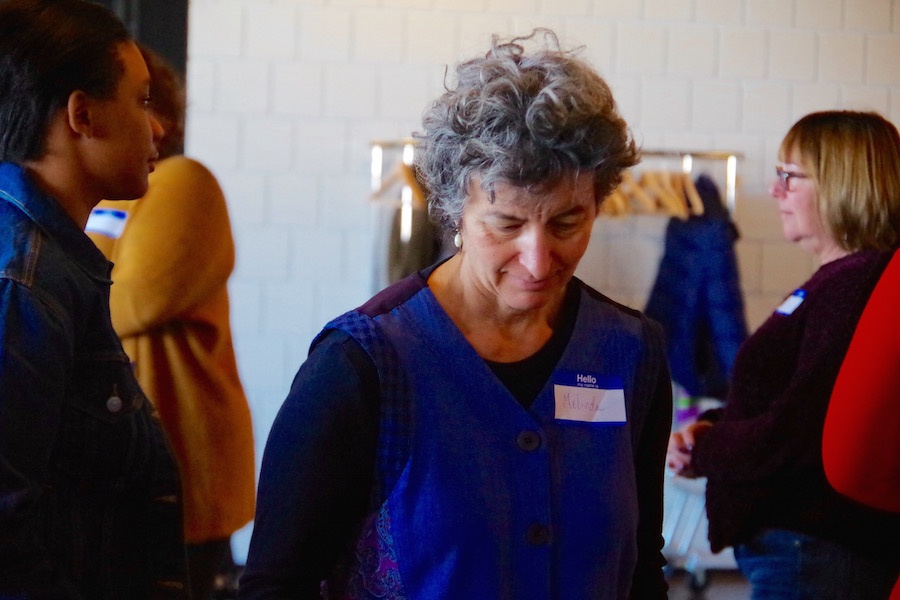 Alcosser watches her step as she ages during an exercise.
Alcosser watches her step as she ages during an exercise.
“I’m thinking, ‘Help me,’” said Hunter Parker, a teacher at Hall High School in West Hartford, as the group froze in place and Christgau asked what was racing through their minds.
In yet another, teachers became customers roaming a store, aware that they were being tracked by a security guard who thought they might shoplift. It was a shadowing of a scenario to come, where participants slipped into character of a teen, hoodie up and backpack filled with books, who was followed by a cop.
For McGee, the moment also hit close to home. While in college in New York City, she and two friends had gone to a Duane Reade between classes, homework and extracurriculars. The two friends were white; she is a black woman. While stile shopping, she’d noticed that a cop was trailing her. So she had turned around, and asked him why.
“It was one of the most important moments in my life,” she said. “I understood the pain [he had] of being raised that way.”
“Try New Things. Do New Things. Step Up.”
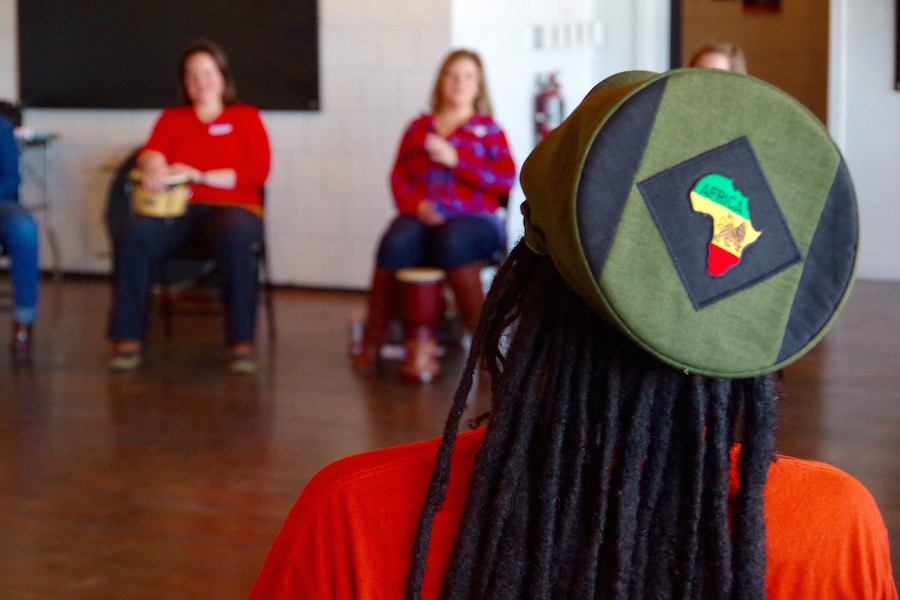 Moses ministers to the circle. “The goal of nonviolence is about building the Beloved Community. This is about leading. Sometimes, we need to try new things. To do new things. To step up," he said during the drumming exercise.
Moses ministers to the circle. “The goal of nonviolence is about building the Beloved Community. This is about leading. Sometimes, we need to try new things. To do new things. To step up," he said during the drumming exercise.
After a break for lunch and crash course in the last principles of nonviolence, teachers returned to their seats to find an instrument next to each one, taut drum skins, tambourines and little bells arranged in the smooth dip of each chair. Before anyone could play, Moses gathered them in a tight circle, urging them to pick a leader, and follow their steps. With a dah da dah/dah da dah/dah da dah/da da da da of his drum, leaders switched off, participants picking up for each other as the rhythm shifted.
At first, participants were slow to warm to the movement. Alcosser volunteered herself as the leader, bringing her arms up and down and slowly moving her hips as she rotated forward. Behind her, teachers Julie Hunt and Mary Parady got a hang of the steps, falling into place.
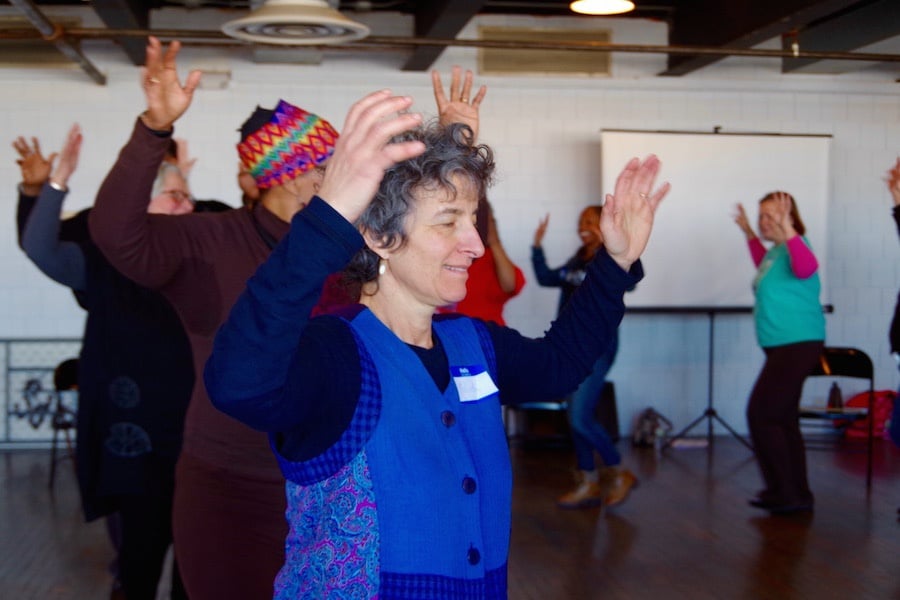

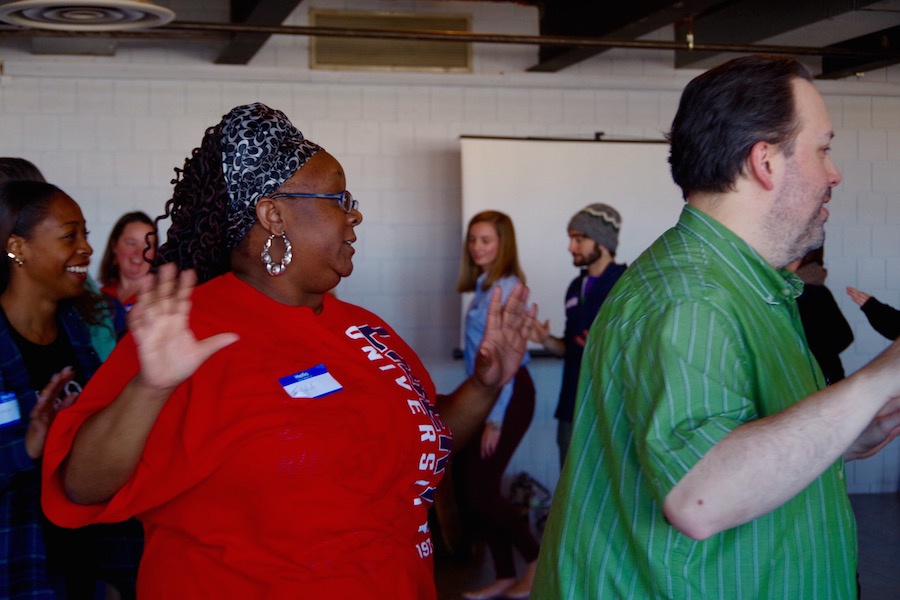
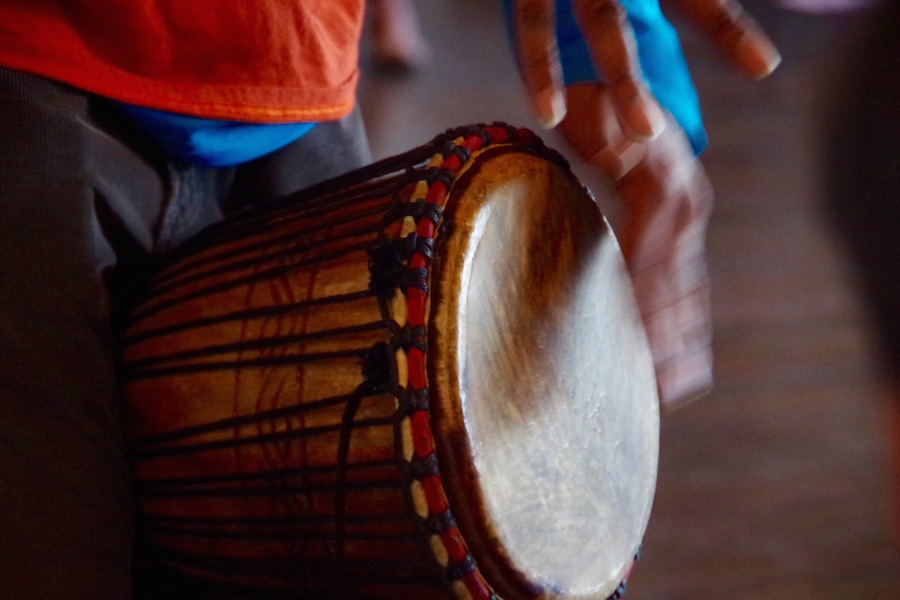
Da da da da, Moses thumped out, a deep-bellied sound that let leaders know to switch it up. Cox took over, then Esposito, then Nearing. Soon each member of the circle had led.
“At the beginning, I said ‘choose a leader,’ and everyone froze and looked at each other,” Moses said. “The goal of nonviolence is about building the Beloved Community. This is about leading. Sometimes, we need to try new things. To do new things. To step up.”
He added that following can be just important—and it’s an act with which some people are more comfortable. Asking participants to take their instruments up, each beat out a rhythm, Moses chanting above them.
Mosquito one/Mosquito two/Mosquito jump in the old man’s shoe, he called out, nodding as the group beat their instruments. One by one, he urged them to stop playing, the din of the room falling slowly into complete silence.
“Wow,” he said. “That was amazing.”
Say Something
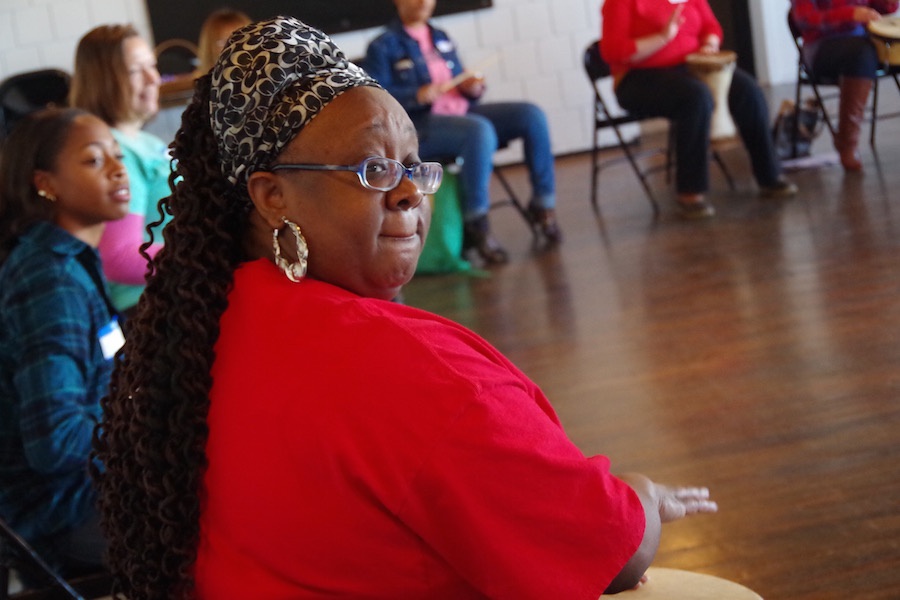
There weren’t instruments for the final section of Ed Lab. Only a PSA: If a kid posts a picture of a weapon on Instagram, students have a duty to report it. Teachers do too—to be their “trusted individual.”
In Ed Lab’s final section of the day, that news came from Marykay Wishneski, a representative of Sandy Hook Promise. Founded by two parents who lost their children in the Sandy Hook Elementary School shooting five years ago, the nonprofit seeks to prevent gun violence in schools before it happens.
Saturday, Wishneski presented on the organization’s “Say Something” campaign, which trains students to know the signs of possible violence, cyberbullying, death threats, and more on social media.
“When you train youth on ‘Say Something,’ they report on everything,” Wishneski said, relaying a story about one school that was now reporting on unsafe handrails right alongside students’ threatening tweets and Facebook comments. “But when you see something, you just have to trust your gut.”
Nearing pointed out that the organization, which will be running student programs throughout the play, has more in common with the CTCN than may first meet the eye.
“The idea is to work with, and to see other people,” she said. “It’s the same core principal.”
Office Hour runs Jan. 17 through Feb. 11 at Long Wharf Theatre. For show times and ticket information, check out Long Wharf’s website. To find out more about the next Ed Lab, click here.

